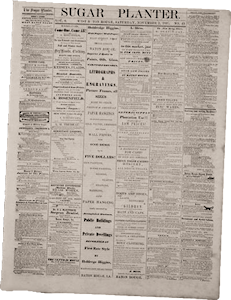Sugar Planter [West Baton Rouge, LA], April 21, 1860
From the New Orleans Mirror.
An article in a late number of DeBow’s Review, from the pen of Judge Hopkins of Mobile, directs attention to the injury which is likely to be inflicted on the South by the system of instructing negroes in the mechanic arts, and employing them as mechanics. He says: ‘If it be desirable to preserve the patriarchal system of negro slavery now subsisting at the South, as the very best bases of social order, of moral and domestic integrity, as well as an agricultural necessity, which none may doubt who has evoked wisdom and virtue in pursuing the question, slaveholders should allay this antagonism in their midst, by agreeing, through legislative action to confine the negro to the soil, thus to elevate and open up the mechanic trades to the non- slaveholding people around them. Dignify the trades to the level of the professions, in common acceptation, and idling, loafing, lounging, fox-hunting, or, in other words, general dissipation of health, energy, and time, among the young men of the South would almost entirely cease, and in their place be substituted general and busy industry. By confining the negro to the soil, the mechanic would be at once converted from an open or secret enemy of negro slavery, into its finest advocate and supporter, because he would then feel himself lifted up in the scale of social respectability, and maintained in that position by the subordinated negro confined exclusively to menial services. Before the law and the community, all white citizens would stand strictly on a footing of equality, and be lone distinguished by courtesy and merit.’
At present it is so common to instruct negroes in the mechanic arts, that in almost every list of plantation slaves advertised for sale some are put down as carpenters, blacksmiths, bricklayers, and not unfrequently, engineers. Considering then the social inequality recognized by law in the South as existing between the negro and white races—an inequality tacitly admitted even in the North—it is by no means remarkable that we have not many free Southern born mechanics. The white mechanics has to submit here to the competition of negro mechanics, and, not only so, but to the degradation consequent on so unnatural and improper a competition. He must work as cheaply as the slave; must submit to an unpleasant companionship which is not expected of him in the North, and must often consent to consider the negro in the light of an overseer. These are facts which cannot be denied, and no young southerner of spirit will consent to learn a trade or calling the pursuit of which tends to degrade him in his own eyes and that of his associates.
If we wish to foster Southern manufactories in which the white men of the South are to seek employment, we must encourage white mechanics by removing the rivalry which now confronts them in our servile population. In the workshops of Northern cities the free negro is not permitted to enter as a mechanic. He can not work at the same bench with the white workman, and his right to a seat in the same railroad car is even sometimes questioned. But here in the south the difference in status between white and colored folks is by no means so distinctly marked. Our planters teach their slaves trades, which, by the inevitable law of social relationships, tends to degrade skilled labor, and in our railroad cars the lady and her servant are seated side by side. In the North the free negro is forced by the pressure of public opinion into the lowest of human employments—such employments as white men are disenclined to engage in—but here the slave is placed in the workshop, or engaged in the erection of new buildings, and the white mechanic who seeks employment of a like character must submit to the degrading companionship. It is therefore evident that the true policy of the South would be to confine negro labor to the cultivation of the soil, leaving the mechanic arts open to that large portion of our population who have not the means to become planters, and see no very flattering prospects of success in the overcrowded “learned professions.” This is a matter worthy of being gravely pondered and promptly dealt with, for the permanent interests of the South are more deeply involved in it than the casual observer would be inclined to imagine.
